Jun 3, 2025 11:25 AM
In Memoriam: Al Foster, 1943–2025
Al Foster, a drummer regarded for his fluency across the bebop, post-bop and funk/fusion lineages of jazz, died May 28…
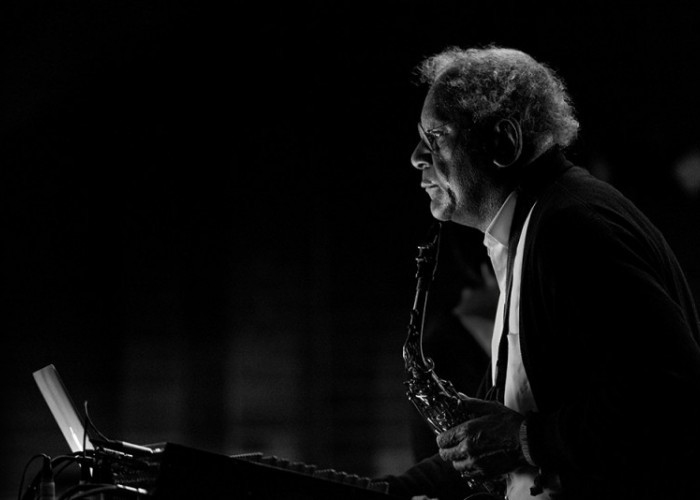
Anthony Braxton, seen here in a publicity photo, headlined the 2017 October Revolution, which took place in Philadelphia Oct. 5–8.
(Photo: Courtesy Ars Nova)The Philadelphia jazz community claimed its own revolution on the first weekend of October, showing a bit of hometown pride and plenty of support for the elder statesmen of the avant-garde.
Taking its name not so much from the Russian “Red October” in 1917 as a four-day festival organized by trumpeter Bill Dixon in New York City in 1964, the Philadelphia October Revolution (which also ran four days, from Oct. 5–8) boasted strong bookings, a great theater and professional lighting and sound engineering.
The spirit of Philadelphia was well represented on opening night, with local legends the Sun Ra Arkestra recreating Space Is The Place, one of the most popular albums the band made while their leader was still earthbound. Sparkling costumes and dance (from the band and audience members) made for a sight to behold, with the span of the Benjamin Franklin bridge visible through the high windows of the riverfront FringeArts theater, an old pumping station that was retrofitted in 2013.
The performance was spirited—of special note was singer and violinist Tara Middleton, who made “Rocket #9” into a powerhouse rap—and under the direction of Marshall Allen (celebrating 60 years with the band next year), the band was focused without losing its freedom.
Also representing the city of brotherly love was the great and underrated Dave Burrell, who played an intimate salon concert in a backstage room for festival pass-holders. The pianist ruminated on some of his evergreen melodies, including the gorgeous “Teardrops For Jimmy” (for bassist Jimmy Garrison) and the angular rag of “Margy Pargy,” during the all-too-short set.
But more than the hometown pride, the festival paid homage to older players with Allen (at 93) leading the Arkestra and Burrell (77) dwarfing the baby grand. Anthony Braxton (72) gave a demonstration of mental acuity on the sax and Burton Greene (80) pontificated from the piano, engaging both in his playing and storytelling. The most anticipated (and by far the most crowded) of the concerts, though, was a rare appearance by the Art Ensemble of Chicago, featuring founding members Roscoe Mitchell (70) and Famoudou Don Moye (71).
The second day showed a bit of curatorial brilliance with three solo performances: Burrell playing a passholder-only backstage salon; International Contemporary Ensemble founder Claire Chase playing Edgard Varèse’s 1936 flute solo Density 21.5 and pieces she commissioned in response to it; and Braxton holding court on the horn that made him famous.
Braxton walked onto the stage with the horn which he made his mark on his 1970 unaccompanied sax record For Alto. He gave what seemed a display of prowess on the instrument in five- or six-minute improvisations concerning, in succession, fingering, breath control, reed control and phrasing, with “’Round Midnight” and Miles Davis’ “Four” worked into the mix.
It’d be nice to say he ended by bringing all those techniques together, but instead he announced what would be his “final composition” which turned out to be a short exploration of disparate blasts followed by gracious thank-yous and no encore. It was the soul of succinctness.
The Art Ensemble’s set opened with an extended bass solo by Chicagoan Junius Paul that led to a quartet of himself, bassist Jaribu Shahid, cellist Tomeka Reid and drummer Moye, and then a solo within that foursome by Shahid. By the time the horns were finally lifted (trumpeter Hugh Ragin briefly and then Mitchell on an expended, unaccompanied sopranino solo), it felt almost as long as one of the intros Coltrane used to give his stalwart Garrison.
The Ensemble played New York City the night before the Philadelphia appearance and was booked to go to London and Germany afterward, but years can go by without concerts under the esteemed name. And there are two things that should be said about their October Revolution appearance. First off, this wasn’t the Art Ensemble of Chicago. This amalgam of musicians had neither the road miles nor the precision steering to maneuver the Art Ensemble track. Second, the Art Ensemble of Chicago is whatever Mitchell and Moye say it is, so the previous point is moot. Maybe they should be the Mitchell/Moye Art Ensemble. But names are no matter. They should just continue to be.
In any event, it was a glorious explosion of group improvisation with Reid absolutely shining. She displayed the sort of controlled frenzy that too many free players fake their way through. The sextet played one long jam into their longtime closing theme, “Odwalla,” and then a brief extended encore that was the strongest group dynamic of the set.
Given the heavy hitters of the first three days, the closing day seemed a bit anticlimactic, although the Norwegian contingent (Cortex and Paal Nilssen-Love with Ballister) brought some energy to the muggy Sunday and Burton Greene (who played at the 1964 October Revolution) gave a short but lovely recital. Hunched over the keyboard of a baby grand in the Christ Church, he played spirited flights of fancy (almost literally so, his arms often flayed or his hands flipping like a pair of wings). A handful of composed pieces included two dedications, “Space Is Still The Place” and “Tribute To Bud Powell,” the latter written when he was just 19.
In all, 18 acts performed over the four days (with gender balance, it should be said, being far from a curatorial strength). Jim Sauter (in duo with Kid Millions) gave an impressive display of feedback and override through the morass of full-throttle improv. Mike Reed’s Flesh & Bone presented a set of innovative and sometimes swinging compositions that harkened back to the politicized jazz of Mingus, Max Roach and Rahsaan Roland Kirk. David Torn’s Sun of Goldfinger and Tim Berne’s Snakeoil both provided opportunities to hear drummer Ches Smith’s ample inventiveness. Rhythm explorations were also undertaken by So Percussion, Man Forever and Adam Rudolph with Hamid Drake, and Zeena Parkins gave a thoroughly exciting performance on electric harp with Yeah Yeah Yeahs drummer Brian Chase.
Just before the Burrell VIP set, Mark Christman (founder and executive director of Ars Nova Workshop, who, with FringeArts, produced the festival) announced that the October Revolution was already set for the first weekend in October, 2018. Short of bringing Sun Ra and fallen Art Ensemble members Lester Bowie and Malachi Favors back to the stage, it’s hard to imagine what he has in mind to top himself. DB
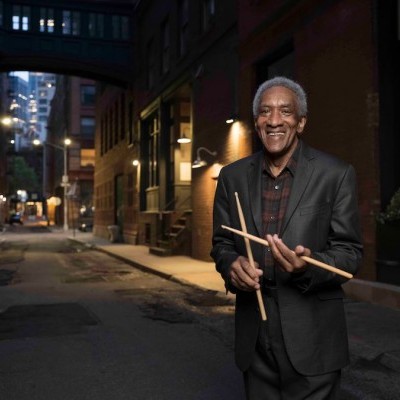
Foster was truly a drummer to the stars, including Miles Davis, Sonny Rollins and Joe Henderson.
Jun 3, 2025 11:25 AM
Al Foster, a drummer regarded for his fluency across the bebop, post-bop and funk/fusion lineages of jazz, died May 28…
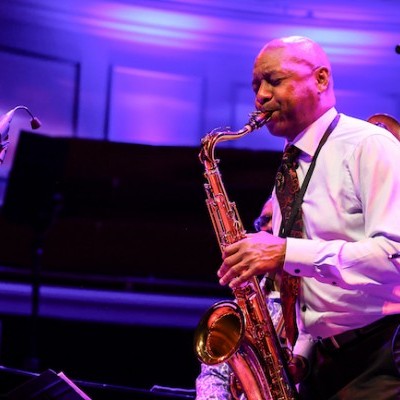
“Branford’s playing has steadily improved,” says younger brother Wynton Marsalis. “He’s just gotten more and more serious.”
May 20, 2025 11:58 AM
Branford Marsalis was on the road again. Coffee cup in hand, the saxophonist — sporting a gray hoodie and a look of…
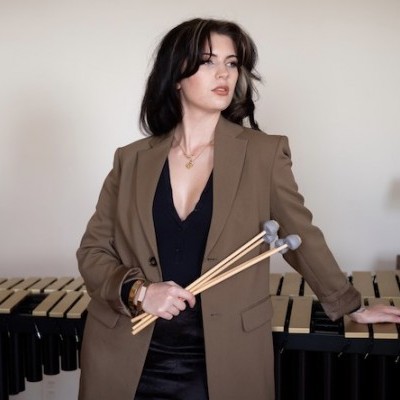
“What did I want more of when I was this age?” Sasha Berliner asks when she’s in her teaching mode.
May 13, 2025 12:39 PM
Part of the jazz vibraphone conversation since her late teens, Sasha Berliner has long come across as a fully formed…

Roscoe Mitchell will receive a Lifetime Achievement award at this year’s Vision Festival.
May 27, 2025 6:21 PM
Arts for Art has announced the full lineup for the 2025 Vision Festival, which will run June 2–7 at Roulette…
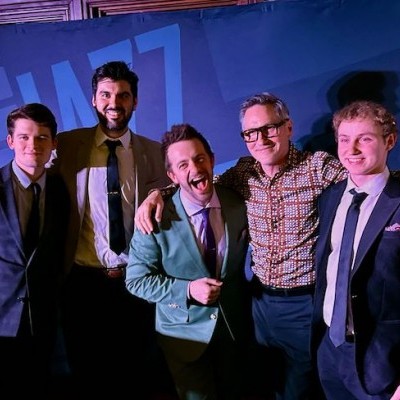
Benny Benack III and his quartet took the Midwest Jazz Collective’s route for a test run this spring.
Jun 3, 2025 10:31 AM
The time and labor required to tour is, for many musicians, daunting at best and prohibitive at worst. It’s hardly…